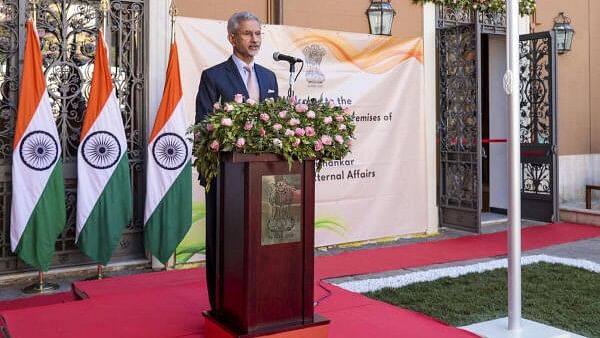
External Affairs Minister S Jaishankar speaks at the inauguration of the new Chancery of the Embassy of India, in Rome.
PTI
New Delhi: Abu Dhabi, Riyadh, and New Delhi are working on the eastern end of the proposed India-Middle-East-Europe Economic Corridor even as the conflict in West Asia stymied its implementation.
“The IMEEC that was announced in September 2023 can be a game changer. The conflict underway currently in the Middle East has undoubtedly been a major complication,” External Affairs Minister S Jaishankar said in Rome, adding: “But the IMEEC is proceeding ahead on the Eastern side, especially between India, UAE, and Saudi Arabia.”
The leaders of India, France, Germany, Italy, Saudi Arabia, the United Arab Emirates, the European Union, and the United States announced an MoU on September 9, 2023, on the sideline of the G20 summit in New Delhi, committing to work together to develop the IMEEC.
The IMEEC will comprise two separate corridors – the eastern corridor connecting India to the Gulf, and the northern corridor connecting the Gulf to Europe. The corridor intends to enhance connectivity, increase efficiency, reduce costs, secure regional supply chains, increase trade accessibility, generate jobs, and lower greenhouse gas emissions, resulting in a transformative integration of Asia, Europe, and the Middle East.
But the terrorist attacks by Hamas on Israel on October 7, 2023, and the retaliatory military offensive by Israel killing over 42000 Palestinians in Gaza hindered the progress on the IMEEC. The conflict also escalated with Iran, Hezbollah in Lebanon, and Houthis in Yemen retaliating to the military operations by Israel.
India and the UAE on February 13 signed an intergovernmental framework agreement for cooperation in implementing the IMEEC. The agreement set the stage for cooperation in the development and management of a logistics platform, including a digital ecosystem, and provision of supply chain services to handle all types of general cargo, bulk, containers, and liquid bulk to enable the proposed IMEEC.
India is also working with Saudi Arabia on the IMEEC.
Jaishankar on Monday noted that the world was experiencing severe stress as two major conflicts were underway, and supply chains were insecure. “Connectivity, especially maritime, stands disrupted. Climate events are more extreme and frequent. And the COVID-19 pandemic has left deep scars,” he said.
He expressed concerns over the situation in the Middle East. “India unequivocally condemns terrorism and hostage-taking. It also regards large-scale civilian casualties in military operations to be unacceptable. International humanitarian law cannot be disregarded. In immediate terms, we should all support a ceasefire,” said the external affairs minister. “India has also extended relief directly and through UNRWA. In the longer term, it is imperative that the future of the Palestinian people be addressed. India favours a two-state solution.”
He said India’s concerns have also been increasing on the widening of the conflict. “We have been in regular touch with both Israel and Iran at the highest levels to advocate restraint and enhance communication,” he added.
